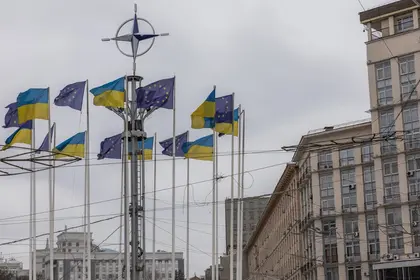On Europe’s eastern flank, Ukrainian soldiers battle human-wave Russian assaults and trench rats, while civilians die in terror missile attacks aimed at undermining the country’s resolve to remain sovereign and free. Vladimir Putin’s overt threats against European Union members have intensified. But at their summit meeting, European Union leaders failed to agree on an aid package for their embattled neighbor.
What the EU managed to offer, by persuading Hungarian Prime Minister Viktor Orban to miss the vote, was agreement to open negotiations for Ukraine’s possible EU accession. But especially with American moral and military support faltering, the decision is a powerful symbol for Ukrainians, emblematic of what they want for their politics.
Most European citizens and their leaders seem to recognize the moral and political imperative of supporting Ukraine. An Irish “workaround’ proposal for EU members to put up funds individually, outside the common EU mechanism, was reasonable, and would have brought the matter closer to the will of voters and tax-payers, as an expression of national and traditional values.
But in the EU, no consensus obtains to act without consensus. Legally mandated European political unity is hobbling action urgently needed to protect the peoples of the continent from Russian aggression; the ideal of unity trumps all other concerns. Member governments must act together, or not at all.

China, EU, Ukraine Leaders Take Davos Stage Under Trump Shadow
Americans are in no position to smirk about the derailment of Europe’s Ukraine funding. Europe must cope with Orban’s obstruction, evidently driven by a calculus that Russia and China own the future, as well as growing illiberal sentiment in a number of member states. American opposition rests on a broad and differentiated base of ignorance-based appeasement, delusions about how Putin’s Russia promotes Christian and traditional anti-woke values, and knee-jerk Democratic Party partisanship preventing compromise on border protection.
Europe’s problem, aside from limp defenses, is reflected in its institutionalized and bureaucratized universalism, which obscures the principles of liberty under a thick blanket of rational-legal proceduralism. The confederal structure resembles the over-extended Holy Roman Empire, while incessant, expensive and ineffective confabs of leaders mirror the aristocratic pretensions of the Congress of Vienna, upon which most modern intergovernmental institutions are modeled.
In this worldview, universal values are embodied in, and cannot be acted upon without universal support. The processes of intergovernmental cooperation, replete with “high-level” officials, inter-agency structures, committees, etc., are what dominate media reports and political consciousness, not the substance of political questions. Outreach from the free and democratic states of Europe to Ukraine, a society existentially fighting for its survival, thus takes the form of opening bureaucratic accession negotiations, in which only a hollowed-out shadow of the ideal of liberty is perceptible.
The opening of EU accession talks was hailed as a “historic moment” and a “signal of hope” by top European officials. While the summit results revealed the weaknesses of the EU’s multilateralism, their significance or Ukrainians is profound. Accession talks symbolize the incarnation of a dream of European identity that animated Ukraine’s human rights movement during Soviet times.
Then, the Ukrainian Helsinki Human Rights Group, while stressing Ukrainian national rights, professed a desire to be part of a Europe where both Ukrainian identity and individual human rights protections could coexist. Their credo was “peace and prosperity in Europe.” They reviled the Soviet Union not only for punishing what communist authorities called their “bourgeois nationalism,” but also for its stifling bureaucracy.
The Helsinki Commission of the U.S. Congress considered the Ukrainian Human Rights Group “the most repressed, in terms of prison sentences, of the Soviet Helsinki Groups.” All but one of its 83 members were jailed by the Soviet regime.
In the post-Soviet period, aspirations for basic rights and freedoms continued to attach themselves to calls for EU membership, and continued to result in murderous assaults by Russian or pro-Russian forces. Well over 100 pro-EU citizens, as well as numerous police officers, were shot dead by snipers in the 2014 Euro-Maidan demonstrations, and since then, hundreds of thousands of Ukrainians have been killed and maimed on behalf of principles of which, in their view, the EU is the arbiter.
In the accession process, Hungary or any other European state can hold up the accession process since each step requires unanimity. Promoting democratic principles, and the freedom and safety of a European neighbor, may demand more flexibility than the increasingly bureaucratic EU superstate can muster.
Aaron Rhodes was Executive Director of the International Helsinki Federation for Human Rights (1993-2007) and is President of the Forum for Religious Freedom-Europe. He is the author of The Debasement of Human Rights (Encounter Books 2018).
Reprinted from HRWF, Human Rights in the World. See the original here.
The views expressed in this opinion article are the author’s and not necessarily those of Kyiv Post.
You can also highlight the text and press Ctrl + Enter










